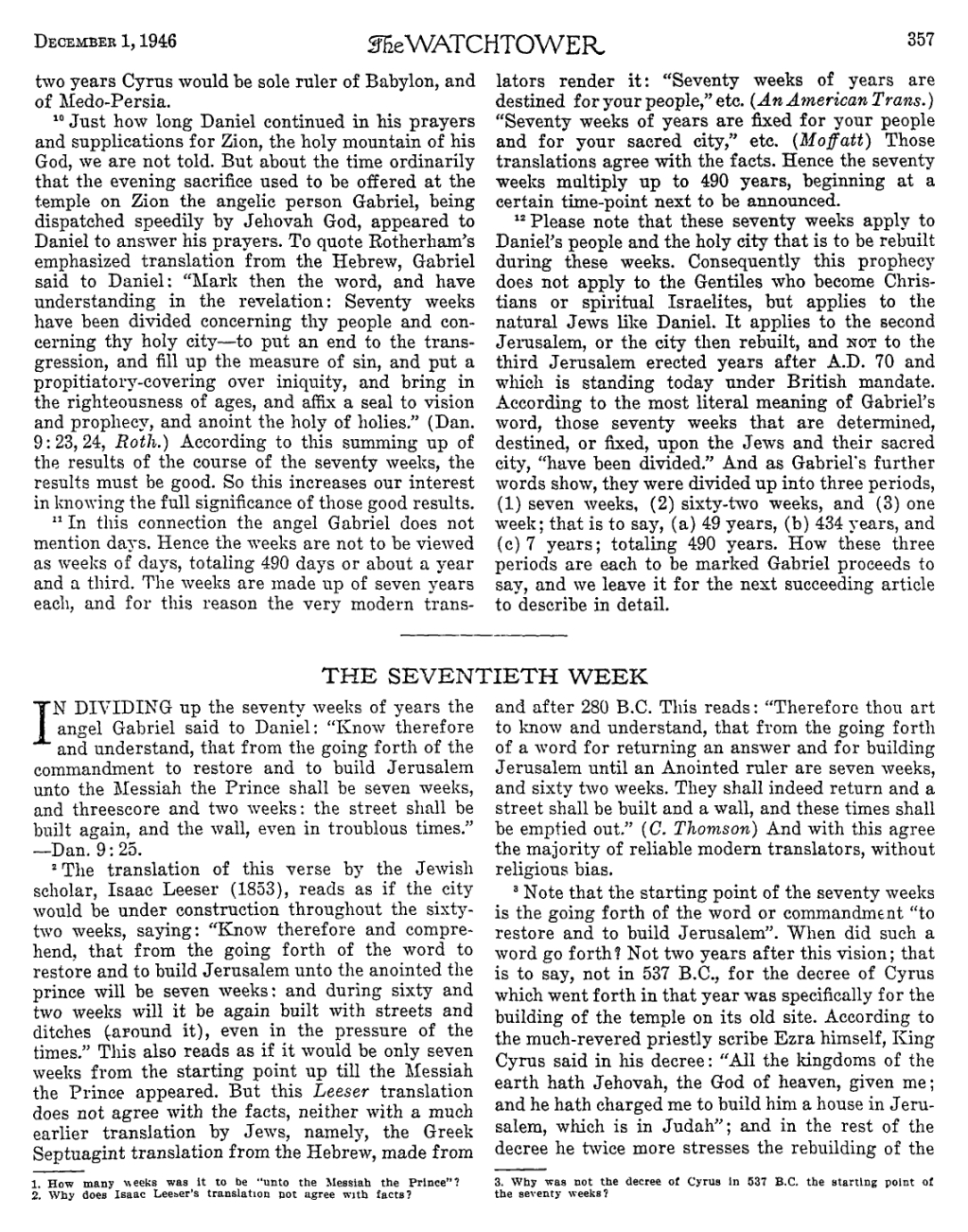This page has not been proofread
DECEMBER 1,1946
The WATCHTOWER
357
two years Cyrus would be sole ruler of Babylon, and of Medo-Persia.
10 Just how long Daniel continued in his prayers and supplications for Zion, the holy mountain of his God, we are not told. But about the time ordinarily that the evening sacrifice used to be offered at the temple on Zion the angelic person Gabriel, being dispatched speedily by Jehovah God, appeared to Daniel to answer his prayers. To quote Rotherham's emphasized translation from the Hebrew, Gabriel said to Daniel: "Mark then the word, and have understanding in the revelation: Seventy weeks have been divided concerning thy people and concerning thy holy city—to put an end to the transgression, and fill up the measure of sin, and put a propitiatory-covering over iniquity, and bring in the righteousness of ages, and affix a seal to vision and prophecy, and anoint the holy of holies." (Dan. 9:23,24, Roth.) According to this summing up of the results of the course of the seventy weeks, the results must be good. So this increases our interest in knowing the full significance of those good results.
11 In this connection the angel Gabriel does not mention days. Hence the weeks are not to be viewed as weeks of days, totaling 490 days or about a year and a third. The weeks are made up of seven years each, and for this reason the very modern translators render it: "Seventy weeks of years are destined for your people," etc. (An American Trans.) "Seventy weeks of years are fixed for your people and for your sacred city," etc. (Moffatt) Those translations agree with the facts. Hence the seventy weeks multiply up to 490 years, beginning at a certain time-point next to be announced.
12 Please note that these seventy weeks apply to Daniel's people and the holy city that is to be rebuilt during these weeks. Consequently this prophecy does not apply to the Gentiles who become Christians or spiritual Israelites, but applies to the natural Jews like Daniel. It applies to the second Jerusalem, or the city then rebuilt, and not to the third Jerusalem erected years after A.D. 70 and which is standing today under British mandate. According to the most literal meaning of Gabriel's word, those seventy weeks that are determined, destined, or fixed, upon the Jews and their sacred city, "have been divided." And as Gabriel's further words show, they were divided up into three periods, (1) seven weeks, (2) sixty-two weeks, and (3) one week; that is to say, (a) 49 years, (b) 434 years, and (c) 7 years; totaling 490 years. How these three periods are each to be marked Gabriel proceeds to say, and we leave it for the next succeeding article to describe in detail.
THE SEVENTIETH WEEK
1 IN DIVIDING up the seventy weeks of years the angel Gabriel said to Daniel: "Know therefore and understand, that from the going forth of the commandment to restore and to build Jerusalem unto the Messiah the Prince shall be seven weeks, and threescore and two weeks: the street shall be built again, and the wall, even in troublous times." —Dan. 9:25.
2 The translation of this verse by the Jewish scholar, Isaac Leeser (1853), reads as if the city would be under construction throughout the sixty-two weeks, saying: "Know therefore and comprehend, that from the going forth of the word to restore and to build Jerusalem unto the anointed the prince will be seven weeks: and during sixty and two weeks will it be again built with streets and ditches (around it), even in the pressure of the times." This also reads as if it would be only seven weeks from the starting point up till the Messiah the Prince appeared. But this Leeser translation does not agree with the facts, neither with a much earlier translation by Jews, namely, the Greek Septuagint translation from the Hebrew, made from and after 280 B.C. This reads: "Therefore thou art to know and understand, that from the going forth of a word for returning an answer and for building Jerusalem until an Anointed ruler are seven weeks, and sixty two weeks. They shall indeed return and a street shall be built and a wall, and these times shall be emptied out." (C. Thomson) And with this agree the majority of reliable modern translators, without religious bias.
3 Note that the starting point of the seventy weeks is the going forth of the word or commandment "to restore and to build Jerusalem". When did such a word go forth? Not two years after this vision; that is to say, not in 537 B.C., for the decree of Cyrus which went forth in that year was specifically for the building of the temple on its old site. According to the much-revered priestly scribe Ezra himself, King Cyrus said in his decree: "All the kingdoms of the earth hath Jehovah, the God of heaven, given me; and he hath charged me to build him a house in Jerusalem, which is in Judah"; and in the rest of the decree he twice more stresses the rebuilding of the
